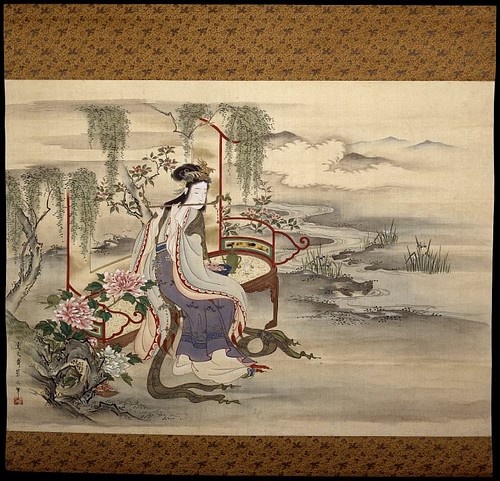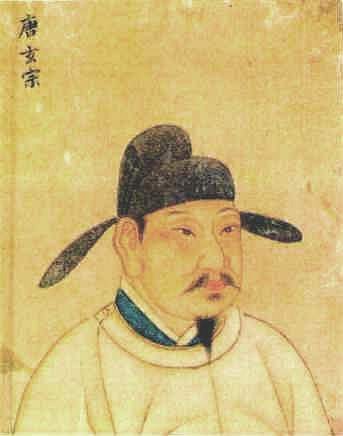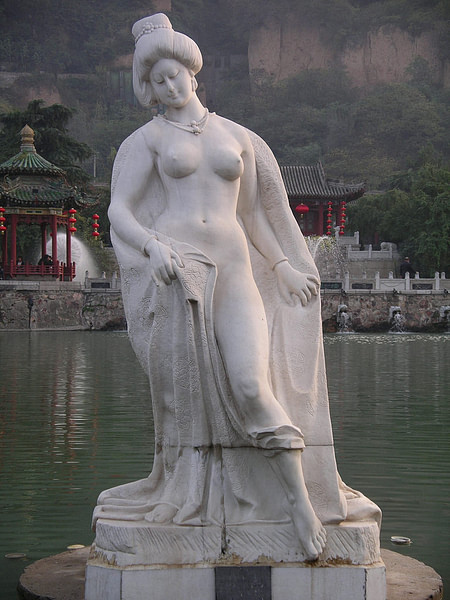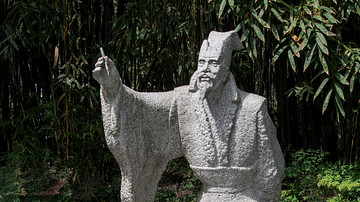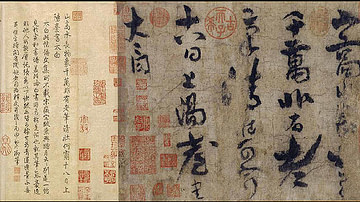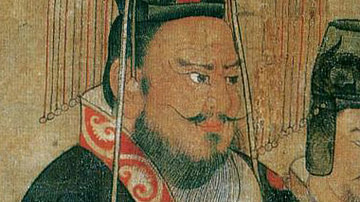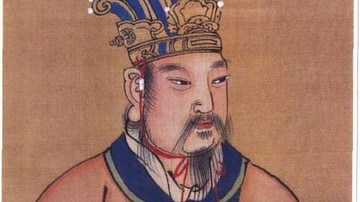The Song of Everlasting Sorrow is a narrative poem of the Tang Dynasty (618-907 CE) inspired by the love affair between Xuanzong (r. 712-756 CE), the seventh emperor of the dynasty, and his consort Lady Yang. It was written by the Chinese poet Bai Juyi (l. 772-846 CE) and is his most popular work.
It was an instant success when Bai published it in 806 CE and has been regularly memorized by Chinese students in the centuries since then. The poem is a romanticized version of the real-life affair of Xuanzong and Lady Yang but is set further back in time during the Han Dynasty (202 BCE - 220 CE). Bai Juyi is known for his highly romantic poetry which uses vivid but also very simple imagery because he wanted everyone to be able to enjoy his work without having to struggle to find its meaning.
Bai Juyi wrote over 2,800 poems on many different subjects and these remain widely read in China and are also popular in Japan. The Song of Everlasting Sorrow (also known as Song of Everlasting Regret) became his most popular, though, because of its themes of deep romantic love, loss, and the image of love lasting beyond death.
The Story in History
Xuanzong is considered one of the best monarchs in China's history for his early policies. He followed the example of his two predecessors, Taizong (r. 626-649 CE) and the empress Wu Zetian (r. 690-704 CE) in reforming the laws, streamlining the bureaucracy, and providing for the people. Under Xuanzong's early reign, China achieved unprecedented wealth and prosperity to become the most affluent country in the world at that time.
Around 734 CE, though, Xuanzong grew tired of his responsibilities and began to rely more on his wife to make his decisions. She suggested he appoint a family friend named Li-Linfu as chancellor. When his wife died, Xuanzong became more withdrawn from public affairs and trusted the running of the government more and more to Li-Linfu. He had over 3,000 beautiful young women brought to the palace to entertain him and kept them there against their will.
Even with all these women under his control, Xuanzong was still unhappy until, in 741 CE, he fell in love with the young wife of his son, a woman named Yang Guifei. Xuanzong had Yang move into the palace with the rest of the women but only spent time with her. She left her husband and became the emperor's consort. He neglected his duties as emperor for this love affair and agreed to anything Lady Yang asked. She began with small requests, which he granted, and these grew into larger demands until she got him to promote members of her family to important positions even though these people could not do the jobs.
All of the important reforms and progress Xuanzong had made started to unravel as the members of Yang's family abused their positions and neglected their duties. At the same time, the policy of using foreign nationals in the army (which had grown out of Xuanzong's military reforms) led to the promotion of some of these men to very high positions of command. Li-Linfu exploited this situation to place men loyal to him in command of the army at the same time he was accepting bribes from Yang's family to appoint them to comfortable bureaucratic posts. The former prosperity of the country began to decline as the people in authority spent more time enjoying themselves than taking care of their responsibilities.
A half-Sogdian/half-Turk general named An Lushan, who was a friend of Lady Yang's, saw the Yang family's abuses as a sign that Xuanzong was no longer fit to rule. An Lushan commanded the best troops in the Chinese army and felt he had a duty to take action and lead these men to restore a proper government; so he mounted a rebellion against the ruling house in 755 CE. He overthrew Xuanzong and declared himself emperor. He was challenged by the Tang forces and his rebellion crushed but he had started something which could not be stopped. The country would be torn apart between the years 755-763 CE and close to 36 million people would die.
Xuanzong fled the capital in 755 CE with Lady Yang and her family. The men of the military escort who accompanied them blamed Yang for the troubles and murdered her family en route. The commanders of the army then demanded that Lady Yang be killed also. Xuanzong refused, but the men would not back down and he had no choice but to comply. He admitted he had allowed himself to be seduced away from his duties and consented that Lady Yang should be strangled.
Xuanzong no longer wanted to rule and was heartsick over the death of Lady Yang. He abdicated in favor of his son Suzong (r. 756-762 CE) and retired from public life. Suzong led the Tang armies into battle but could not defeat An Lushan no matter how he tried. Suzong and Xuanzong died of disease within two weeks of each other in 762 CE, and he was succeeded by Daizong (r. 762-779 CE) who finally restored order.
The Story in the Poem
In the poem, an emperor of the Han Dynasty falls in love with a beautiful young girl who has no experience of the world. The poem states that she was "Raised in the inner chamber, unseen by anybody". She is so beautiful that "if she turned her head and smiled she cast a deep spell/Beauties of Six Palaces vanished into nothing". The emperor selects her as a concubine and becomes so entranced by her that he forgets his responsibilities. The poem states, "The emperor neglected the world from that moment".
The two lovers enjoy every minute they can together until war breaks out and the emperor is expected to lead his troops in battle. He cannot leave her alone and brings her with him to the war. The men see that the emperor is distracted and they are going to be defeated and killed unless he comes to his senses. They demand that the lady be killed, and the emperor has no choice but to allow it. After her death, the emperor regains his focus and leads his army to victory. He returns to his palace where he reflects on all the happy times he had with his lover and misses her.
The emperor has a Taoist priest contact the land of the dead so he can speak to his lover again. The poem describes the priest searching everywhere for her and finally waking her up where she slept on a magic island in the afterlife. She has moved on, though, and no longer has anything to do with earthly desires. The poem says how "when she turned her face to look back earthwards" she saw only "mist and dust clouds".
She thanks the emperor's messenger for coming and asks him to relay a message; then she breaks her golden hairpin in half and gives one to him along with a piece of her lacquer box. The spirit of the lady asks the messenger to give these gifts to his emperor and tell him that she still loves him and "Our spirits belong together, like these precious fragments" and how "sometime, in earth or heaven, we shall meet again".
She references the myth of Niu Lang and Zhi Nu, the god and goddess of love, who can only meet with each other on the seventh night of the seventh month each year in the night sky (represented by the star Vega, who is Zhi Nu, and the star Altair, Niu Lang, which are on opposite sides of the Milky Way except for one time every year - on the seventh night of the seventh month). The poem ends with the lines "Earth fades, Heaven fades, at the end of days. But Everlasting Sorrow endures always."
The Poem's Significance
The two most famous poets of the Tang Dynasty were Li Po (l. 701-762 CE) and Du Fu (l. 712-770 CE), who were both praised for their vivid imagery and clever allusions in depicting everyday scenes. Xuanzong was a Taoist who decreed Taoism the national religion but Confucian principles of propriety still governed people's behavior and attitudes, and art was expected to reflect Confucian principles, which these poets did.
Poetry was expected to express reality, even if that reality was heightened or the details were not exactly true. Li Po, for example, wrote a poem about a party where the narrator praises "a drinking bout of at least three hundred cups" and says "All I want is to be forever drunk, never sober", and these lines do not reflect Confucian values. Li Po was praised, though, because the poem accurately reflects the attitudes of someone drinking at a party.
Bai Juyi's poetry was criticized because it was often considered inappropriate and did not reflect reality or Confucian values. His work was considered lower class because it was more accessible in content and imagery than poets like Li Po or Du Fu.
Song of Everlasting Sorrow was especially criticized by Confucian scholars for warping people's impression of what really happened to Lady Yang and how her death came about. Literary critics condemned the poem's sensuality and romanticism and claimed that Bai was lowering the standards of his art by writing for the masses.
The masses loved the poem, though, and it became a best-seller when Bai published it. Fans of Bai's work did not care about the judgments of scholars or critics; they just responded to the beauty of the verse and the story of the tragic love affair. It elevated Lady Yang from her role in history as the woman who brought down the Tang Dynasty to the girl who allowed herself to be sacrificed for the greater good of the country. The conclusion of the poem, when the lady speaks to the messenger from the afterlife, offered consolation to those who had lost people they loved and this made the work very appealing.
The poem also elevated Lady Yang to a mythical level as one of The Four Beauties of China. The Four Beauties are four women whose actions dramatically affected the fate of the nation. They are Xi Shi of the Spring and Autumn Period; Wang Zhaojun of the Han Dynasty; Diaochan, a fictional character from the book Romance of the Three Kingdoms; and Yang Guifei. Some lists include a Fifth Beauty, Consort Yu (also known as Lady Yu) famous as the concubine of Xiang-Yu who sacrificed herself for her lover at the Battle of Gaixia in 202 BCE, while other lists replace Diaochan with Consort Yu.
The theme of the beautiful woman who dies to save her lover or destroys a man of promise (or, often, both) was very popular in ancient China and continues to be in the present day. Bai Juyi's version of Lady Yang's death and Xuanzong's grief has probably inspired many people to write similar stories but the best-known work to draw upon it is Lady Murasaki's The Tale of Genji, a classical work of Japanese literature published in 1008 CE and still widely read today. This is not surprising since Song of Everlasting Sorrow touches on themes which people will always relate to such as love, sacrifice, death, and the hope that one will be reunited one day with those one has lost.
The Complete Poem
Below is the complete poem by Bai Juyi, adapted by DW Draffin:
A certain Emperor of the Han dynasty
loved love even more than life,
and longed for a woman so beautiful
that He could forget the court and all his duties.
His empire could collapse and He wouldn’t care.For years He ruled the empire,
seeking her but never finding her.
Yet a girl from the house of Yang
was just coming of age.
She had been raised in the women’s chambers
and remained unknown to the outside world.
Possessed of a natural elegance and grace,
she had a spellbinding beauty.
There came a day when she was selected
to wait upon His Majesty.
Her sweet smile warmed His cold and lonely heart.
The ladies-in-waiting from the six palaces
with their powdered empty faces couldn’t compare.The velvet waters of the hot spring
washed over her pale white skin.
She was so delicate and fragile,
palace maids needed to lift her from the water.
The Emperor called upon her.
Her face was like a blossom,
golden jewelry adorning her jet black hair.
They warmed themselves together
during the spring nights in a hibiscus tent,
lamenting that spring nights ended too soon,
so they never rose with the sun, but stayed in bed.The Morning Court continued,
but His Majesty no longer attended.
The girl spent all her time at the Emperor’s side,
pleasing Him, feeding Him at banquets.
During the entire spring she went wherever He did
and slept beside Him every night.
3000 beauties lived in the inner palace
But He loved this one girl more than all 3000.
He was charmed just watching her,
as she applied makeup in the Golden House
before they began their evening.
The wine and the springtime air
intoxicated her after the Jade Mansion banquets.All of her brothers and sisters
were granted land.
Their sudden wealth and rise in status
made others envy her family’s fortune.
It changed the plans of new parents everywhere.
What good were boy babies
when girl babies could do so much?Mount Li Palace was perched so high
that its spires touched the azure clouds.
The winds carried heavenly music,
audible everywhere.
The orchestra played slow songs
as dancers moved perfectly in time.
His Majesty could watch and listen
all day long, and still need more.
Then war drums from Yuyang
broke the spell, shaking the earth.
The Song of Rainbow Skirts and Feather Robes
came to an abrupt halt.
The nine rings of walls and watchtowers
surrounding the imperial palace,
were swallowed by dust and smoke,
as a thousand chariots and countless horsemen
raced to the southwest.Back and forth, stop and start,
the jade ornaments rocked on the imperial banners
of the Emperor’s chariot.
They had traveled over one hundred li
from the western gate of the capital.
Now the Emperor’s six armies
refused His command to march a step further.
They gave him an ultimatum: her or them.
The beautiful maiden He adored,
her brows as lovely as a moth’s feathery feelers,
died thrashing before the horses.Her ornate headdress fell to the ground
and no one picked it up.
Her kingfisher hair ornament,
gold sparrow hairpin, and jade hair clasp,
lay in the mud.
His Majesty covered his face.
He could not look. He could not save her.
All He saw was a stream of tears and blood
running along the ground.A bleak and cold wind
carried yellow dust.
Wooden walkways wound
high among the clouds
through the pavilions of the pass
at Mount Jian.
Few traveled on the road beneath Mount Emei.
The banners hung sadly on their poles.
The sky was pitiless.
The rivers of Shu were blue
and the mountains of Shu were green.
The Emperor thought of her night and day.
In His second palace, He lifted a face
filled with devastation to the moon.
The wind chimes during an evening rain storm
were the sound of his sorrow.The rebellion defeated,
the Emperor’s dragon chariot returned.
And once He had come back,
He couldn’t bring himself to leave.
But in the dirt on the slopes of Mawei
He did not see her face of jade,
He only saw the lonely spot
where she had died.
The Emperor and His ministers
cried so long they soaked their robes.They pointed their horses to the east
and let them walk at their own pace
back to the capital.
They returned to find the ponds and gardens
the same as before.
The lotus plants of the Taiye ponds
and the willow trees of Weiyang Palace...
Oh, but the lotus blossoms were her face
and the willow branches
were her delicate brows.
Her face was everywhere.
Tears filled His eyes again.
Gone were the fresh spring days
of the blooming peach and plum.
Now it was autumn, when the leaves
of the Wutong trees had fallen.
The Western and Southern Palaces
were overgrown with yellow grass
and scattered red leaves
collected on the steps.
The hair of the performers in the
Pear Garden Royal Opera
had all turned white.
The eunuchs and palace maids
of Pepper Residence had suddenly aged.He sat in silence in the evening palace,
alone with His thoughts,
only the fireflies for company.
The single lamp burned itself out,
and still He could not sleep.
The bells rang and the drums beat
as each watch began,
marking the start of another long night.
The Milky Way shined down brightly.
Oh, how he longed for each dawn.
The mandarin duck tiles were icy
and the frost would not melt.
The bed’s jadeite quilt had gone cold.
As it should be. None could warm Him.A year passed, a full year since
the living had been divided from the dead.
Her spirit did not appear in His dreams.
A Daoist priest from Linqiong
visitied the capital.
He was so pious
the dead would speak to him.
Moved by His Majesty’s anguish,
he agreed to look for her spirit
in the afterlife for the Emperor.
Up, into the sky he ran
like a lightning bolt,
racing high above the clouds.
The priest climbed into the heavens
and descended into the earth,
seeking her spirit everywhere.
Above, he left no spot unsearched,
and below, as far as the Yellow Springs.
But in neither vast region
was any trace of her to be found.Yet what was this news
of a mountain floating on the sea,
filled with celestial spirits?
When the priest approached,
the floating peak was wreathed in haze.
But a slender tower emerged,
piercing the vibrant clouds.
In this tower,
he found a host of celestials
filled with feminine grace.
One stood out to him.
She was called Tàizhēn,
And her face was lovely and pale.
Did not her snow-white face
match the Emperor’s lost love?
The priest approached the golden tower
and knocked on the jade door
of the western wing.
He begged Xiǎoyù to bring
a message to Shuāngchéng.
She did so, for the priest was
an emissary from the Han Emperor,
the Son of Heaven.Inside a resplendent tent,
the girl awoke from her long dream.
She pushed aside her pillow
and reached for her robes.
Then she paced, dazed, in the tent.
Finally she found the pearl lace curtains
and passed through the screens of silver.
She came to the priest with her hair askew,
for she had slept so long.
Her headpiece too was crooked
as she descended the steps to him.
She raised her arms and a celestial wind
fluttered the sleeves of her gown.
It was a remembered move from her
Dance of Rainbow Skirts and Feather Robes.
But her jade countenance was now
crisscrossed with tears.
Like a pear blossom
wetted by the springtime rains.She fixed her stormy gaze on the priest
and asked him to relay her thanks
for her rescue to His Majesty.
Yet in the time since they had parted,
a distance had grown between them,
and now she only felt a vague familiarity.
The passion they had shared
in the Hall of the Bright Sun
had faded.In the winter, the days and months
in Penglai Palace are long.
She looked down at the places mortals dwell.
But she could not see Chang’an
through the dust and mist.
To show her gratitude, all she could do
was offer old heirlooms and keepsakes
as a sign of her deep affection.
She honored the priest with
her inlaid box and golden hairpin.
But she kept one piece of the pin
and one leaf of the box.
Thus the parts of the pin and box
would forever be separated.She bid him tell His Majesty
to remain as firm in his devotion to her
as the gold and inlay work of her gifts.
Some day they would meet again,
whether in the heavens above
or among the mortals on earth.
She gave the priest one final message,
a secret promise that only
the two of them would know:
“On the seventh day
of the seventh Lunar month,
in the Hall of Longevity,
at midnight, when none are around,
we will make our secret pact.
In the heavens, we vow to be
as two birds, flying wingtip to wingtip.
On earth, we vow to be
as two intertwined branches of a tree.
Even heaven and earth
will end some day.
But the regret of our parting
will never end.”
